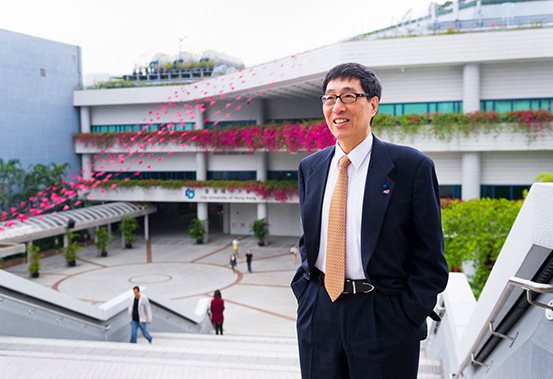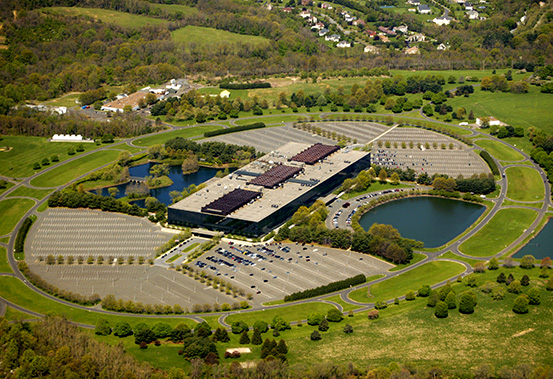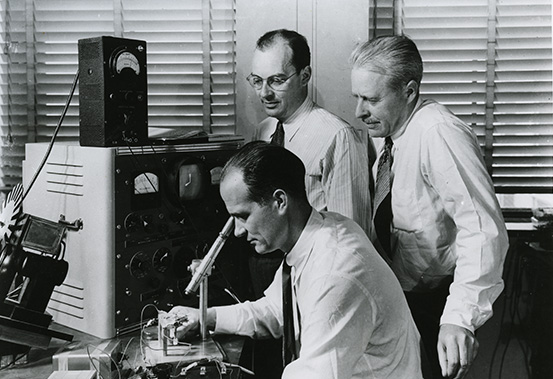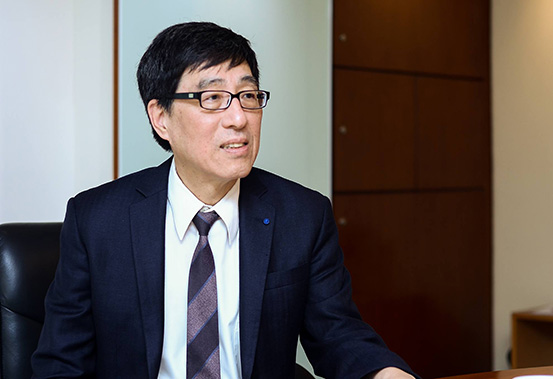Professor Way Kuo has been President of City University of Hong Kong since May 2008. A pioneer in reliability research of systems at their infant stage, Professor Kuo is renowned for his work in designing the reliability of electronics systems and nuclear energy, and has made breakthroughs in nano-reliability research. Here Professor Kuo talks about his educational upbringing, how to get an innovation culture up and running in Hong Kong, and how to respond in the face of critical incidents such as the recent green roof collapse at CityU.
Since joining CityU, President Kuo has presided over a number of learning and teaching initiatives which encourage student innovation. The Discoveryenriched Curriculum encourages students to take risks and to explore the unknown, an interesting departure in an educational culture which is often seen as 'top-down' in character. Way Kuo was himself brought up in the postwar Taiwan of the 1950s. As a start point, we explore the educational culture he experienced there.
On education
Was the asking of questions encouraged in Taiwan? "Strictly speaking I don't think we know how learning takes place," the President began. "There are two different theories. One is that you have to memorise everything, and the other that you don't have to. We don't really know which way is better. I know a few Nobel Laureates in Chemistry and they say the best way is to memorise everything. Even some poets say the same. The current trend is "don't memorise – ask questions", but the younger generation sometimes ask a lot of questions that are ill-informed from the outset."
But what about his personal experience in Taiwan? "When I grew up we had to memorise a lot of things, and it actually helped. It depends on the individual. I don't think there is a formula for everyone. In our classrooms it was more old style, one direction communication."
On completing his first degree, Way Kuo moved to the United States, studying for his PhD degree in engineering at Kansas State University.
"The US was similar. My professors gave a lot of lectures. Many of the best scientists are quite quiet. And you don't necessarily have to talk to communicate. I think that is a misconception these days. People rely so much on talking."
So where is the interactive element in the US system? "You do research, you have teamwork, you present your project. My education in Taiwan was also very American." For the President, educational dialogue in the US seemed to occur around research projects: "You can solve a lot of open-ended questions through projects."
What, then, of the lecture? Is this not an outmoded concept in an era where educational methodology encourages interaction? Here the President is upbeat:
"I can have dialogue with my students in the lecture theatre, even with 800 people at a time. Maybe you are surprised, but communication is not necessarily better in smaller classes. It's not a function of size, rather the capability of the faculty."
It turns out that despite lectures being a mainstay of university education, they do still need to be complemented with other strategies:
"In fact, for me lecturing is not the most important thing; discussion is. If students take a course, they must learn something from the teacher beyond the textbook. We need to give more space to engage students and for them to have discussions."
Why Smart City?
Professor Kuo is a long-time supporter of the Smart City concept, which is written into CityU's current Strategic Plan as one of the lead research themes, and he is emphatic on its importance:
"Global warming is a reality, and the provision of clean energy is vital for all of us. We need to look at how to use energy more efficiently, and to research how this can be achieved. We don't treasure energy enough in Hong Kong."
In Professor Kuo's estimation, legislation is important and Hong Kong is in a good position to promote the Smart City. Government should take a lead and big data can provide optimal solutions. It is important not to take a reactive stance to critical events. He brings up the recent collapse of a sports centre green roof on the CityU campus, an incident which thankfully caused no fatalities.
"When it collapsed there was a backlash. Some people started to question whether we needed a green roof. But I said the concept is good. It is the implementation we have to work on. We should not backtrack on green energy conservation measures."
Many people expressed surprise that Hong Kong, with a reputation for being a very regulated society, did not have laws in place to regulate green roofs which have become ubiquitous on institutional rooftops over the last ten or fifteen years.
"If we all know how to behave, there's no need for regulations. But once you have a lot of regulations, implicitly anything that is not regulated is OK. And because regulations cannot be exhaustive, people will still make mistakes. I am not surprised at all. Fewer regulations may be the best way forward. This may sound philosophical, but it's actually quite practical."
The place where the tech world was born, now a modernist ruin. Old Bell Labs Holmdel Complex, located in New Jersey, about 20 miles south of New York
© Lee Beaumont/Wikimedia Commons/CC-BY-SA-3.0
Building an incentive culture
Professor Kuo sees endemic regulation as creating a wider and potentially unwelcome effect:
"Because of over regulation, innovation is held back in Hong Kong. Do nothing and you are safe. You follow the rule and you are fine."
Innovation is recognised as an area where Hong Kong performs less well than with infrastructure. In the World Economic Forum Global Competitiveness Report, released in September 2015, Hong Kong was ranked the seventh most competitive economy in the world, but only 27th in terms of innovation. To help address this situation, last year an Innovation and Technology Bureau was established with the brief to formulate holistic policies, and to foster development in related industries in Hong Kong.
Here, Professor Kuo strikes a cautious note: "We need to take away the formality. If it's just a bureau, and you monitor regulation, you are not going to have innovation."
"If I were a political leader I could turn this downsideup. I would have a policy to place funds strategically. If students form a company in a university, and if they make 10 dollars' profit, government could match it, for a period of five years or so."
Government can also specify strategic areas for development.
"If you think biomedicine is important, or energy, government can offer matching funds in these areas. Research areas can be defined even more narrowly, for example battery technology."
"You set a policy, based on a strategy. People are incentive driven. So we need to go beyond regulation from the government side. We need a strategically driven incentive culture."
Smart City Hong Kong?
Professor Kuo's perspective on Hong Kong is forthright:
"The beauty of Hong Kong is order, and everything is well defined. We have no shortage of regulations and they do serve a purpose. The judiciary, the banking and the financial sector are thriving because there is transparency. That works well, but innovation is yet to happen. This is a very good follower society."
Elsewhere he has argued that when we move towards the knowledge economy era, businesses will support their research through consultation and patent authorisation – this has become a successful model in Korea. It is understandable that Hong Kong was not good at technology innovation pre-1997 when it was still a colony. But even after the sovereignty handover, technology performance has been uneven, lagging behind neighbouring cities despite the fact that the city has a rich pool of human resources. He explains this through a long-time micro-management style and relative tardiness in leveraging the potential of the new technology era.
The President challenges us with an open question. Could we give an example of any innovation coming out of Hong Kong in the last 30 years? My colleague Jaime came up with the famous example of the drone developed by a group of students from The Hong Kong University of Science and Technology (UST) which couldn't attract funding in Hong Kong and found a home in Shenzhen.
"UST can be proud that they produced the students, but Hong Kong could not support it," he responded. "Of course some of the good projects are going to go overseas. But home-grown innovation means that they should be rooted in Hong Kong. We are in a situation where in 30 years no big step innovation projects have rooted in Hong Kong."
By contrast transport and logistics work impressively.
"I think our airport and our subway are the best in the whole world. Implementation is a strength here. But somehow we are wasting the IQ of Hong Kong people. We should leave room for innovation. Relax the rules, set up policy, use the Innovation and Technology Bureau in a constructive, proactive way. So far we haven't done enough."
"Early adopters face lots of challenges. But we have also to look at the wider cultural context, the Chinese mentality. As the saying goes: 槍打出頭鳥. The first bird which shows its head out of the nest gets shot."
The limits of pure research. After inventions such as the transistor, information theory, lasers, and solar energy, Bell Labs finally pulled out of fundamental physics research in 2008
Photo courtesy of the Computer History Musuem
The first bird out – Bell Labs
Back in the early 1980s, the recently graduated Way Kuo worked as a researcher at Bell Laboratories, a venerable corporate institution which was responsible for a string of big step innovations. As Douglas Coupland, author of Generation X, has documented in his book Kitten Clone, a mordant celebration of Bell's decline in its latter-day guise as Alcatel-Lucent, Bell Labs was first out of the nest on a striking number of occasions:
Since 1925, Bell Labs has generated 7 Nobel prizes, and changed the course of humanity with stunning regularity. No California redwood forest full of brainstorming genius millionaires could compete with Bell Lab's creative heyday in the mid-twentieth century: the transistor, information theory, lasers, solar energy, radio astronomy, microchips, UNIX, mobile phones, mobile networks – all invented here.
In 1996 Bell Labs was spun off as Lucent Technologies, briefly enjoying a dream ride as a tech stock in the late nineties before crashing in the wake of the 2001 dotcom bust. What went wrong and, more generally, how and where is research best conducted? Public or private, "pure" research or mixed with business? Given his background across both continents and sectors, Professor Kuo is instructive:
"Bell Laboratories failed because they went too far in the direction of pure research. They didn't have an education component, and as a company they didn't make a profit, so they disappeared. Now, as a university we don't have to worry so much about income. We should of course look after the bottom line, but we don't need to make a profit."
"Latter day corporate campuses such as Google have invention in their DNA; it drives their business. Bell Labs on the other hand pursued invention for its own sake. A balance is needed. Similarly, universities can develop outreach education, but best not to go to an extreme in pushing a commercial teaching operation."
"Universities have to rigorously define their purpose. Our purpose at CityU is teaching and research. We are not running a business. One reason we are successful is that we have defined our mission and focused on it. Otherwise you dilute your purpose."
Smarter energy
An important component of the Smart Cities package is clean energy. What is the ideal mix of energies for Hong Kong?
"Hong Kong does not have so many choices for sustainable energy, no wind, no solar or tidal. We have nuclear, coal and gas. In my opinion we should minimise and then eliminate coal. Coal is hurting us. Hong Kong is a very small territory. We cannot be isolated. We need to work with the neighbouring states to achieve clean air."
Professor Kuo's support for a spectrum of energies to meet the global energy demand is well documented in his recent book, Critical Reflections on Nuclear and Renewable Energy. Here, he chronicles how emissions from new coal-burning power plants planned in Guangdong may cause as many as 16,000 deaths in the next 40 years. In the wake of Fukushima, the nuclear industry has been under pressure, but he posits the question, what is more important: to give up nuclear energy altogether or to cut down on the use of carbon?
Professor Kuo believes that Hong Kong could easily save 10% of its energy consumption through better practice and simple energy saving devices – and 10% is the equivalent of a new power station.
"Hong Kong is a rich city with relatively cheap electricity, and people are often not so mindful of their electricity bills. We need to do more with power-saving strategies and incentives."
The President also argues that we need to formulate a comprehensive policy on energy conservation, environmental protection, innovation and safety of energy use. In addition, we should constantly develop new energy sources and design an optimal plan of power distribution by making use of smart grid and cloud computing technology. One thing is clear: given the prevailing wind system (approximately nine months of the year from the north), for Hong Kong any meaningful clean air strategy has to be part of a regional solution.
" One reason CityU is successful is that we have defined our mission and focused on it. Otherwise you dilute your purpose "
Striving for balance
A thread runs through Professor Kuo's approach: striving for a sense of balance. So, in educational methodology, communication is multi-directional: yes, lectures offer opportunities for interaction, but need to be leavened with other more interactive strategies (tutorials, seminars). In society, regulation is not a sufficient solution and needs to be judiciously applied so as to leave space for invention and creativity; exhaustive prescription is counter-productive. An implementation-focused society needs to be incentivised to take risks and reinvent itself. In business, innovation strategy must be informed, if not driven by economic considerations. Research for its own sake won't work; Google rather than Bell had it right. And in real time, it is better to respond rather than react to events (including critical events such as roof collapse or nuclear melt-down). So, green roofs should not be rejected out of hand; and nuclear is still a viable energy despite the Fukushima accident.




